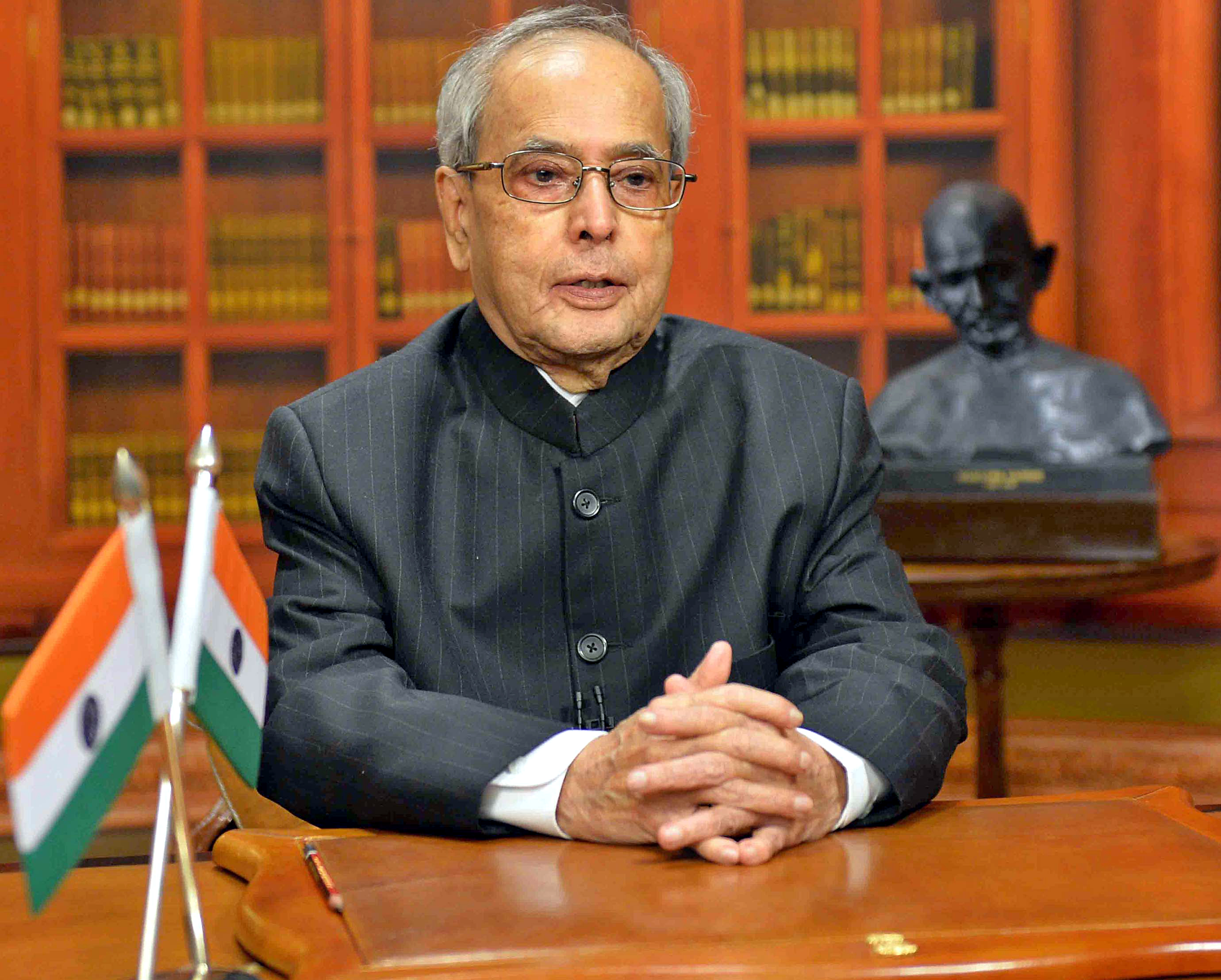NEW DELHI, Jan 25:
President Pranab Mukherjee today said that ideally dialogue should be a continual engagement for resolving disputes among nations but peace cannot be discussed under a “shower of bullets”.
In significant remarks that come against the backdrop of the Pathankot attack, he also said terrorism is a war beyond any doctrine and is a “cancer which must be operated out with a firm scalpel”.
“There is no good or bad terrorism; it is pure evil,” the President said in his address to the nation on the eve of 67th Republic Day.
Mukherjee said nations will not agree on everything but the challenge today is existential because terrorists seek to undermine order by rejecting the very basis of strategic stability which are recognised borders.
“If outlaws are able to unravel borders, then we are heading towards an age of chaos. There will be disputes among nations; and, as is well known, the closer we are to a neighbour, the higher the propensity for disputes.
“There is a civilised way to bridge disagreements; dialogue, ideally, should be a continual engagement. But we cannot discuss peace under a shower of bullets,” he said.
Mukherjee said that the sub-continent has a historic opportunity to become a beacon to the world at a time of great danger.
“We must attempt to resolve the complex edges of the emotional and geo-political inheritance with neighbours through a peaceful dialogue, and invest in mutual prosperity by recognising that human beings are best defined by a humane spirit, and not their worst instincts. Our example can be its own message to a world in anxious need of amity,” he said.
The President asserted that the optimism at the beginning of the 21st century that energies of people would be committed to a rising prosperity that would eliminate the curse of extreme poverty has faded in first 15 years.
“There is unprecedented turbulence across vast regions, with alarming increase in regional instabilities. The scourge of terrorism has reshaped war into its most barbaric manifestation. No corner can now consider itself safe from this savage monster,” Mukherjee said.
He said terrorism is inspired by insane objectives, motivated by bottomless depths of hatred, instigated by puppeteers who have invested heavily in havoc through the mass murder of innocents.
Tracing the birth of Indian Republic in 1950, the President said India today is a rising power fast emerging as a global leader in science, technology, innovation and start ups and whose economic success is the envy of the world.
Meanwhile, in an apparent message to law makers and Government against the backdrop of the stalled GST Bill, President Pranab Mukherjee today said it was their duty to ensure reforms and enactment of progressive legislations for which a spirit of accommodation and consensus building should be the preferred mode of decision making.
For revitalising the forces of growth, the President said there is need for reforms and progressive legislation.
“It is the bounden duty of the law makers to ensure that such legislation is enacted after due discussion and debate. A spirit of accommodation, cooperation and consensus-building should be the preferred mode of decision-making. Delays in decision-making and implementation can only harm the process of development,” he said in his address to the nation on the eve of 67th Republic Day.
The President’s remarks assume significance in the context of the deadlock over the Constitution amendment bill on the Goods and Services Tax (GST) following Congress’ three main demands which the Government has refused to concede.
The President said last year the country was denied the bounty of nature with large parts of India affected by severe drought, other areas reeled under devastating floods.
Unusual weather conditions impacted agricultural production. Rural employment and income levels suffered, Mukherjee said.
“The year 2015 has been a year of challenges during which the global economy remained subdued. Unpredictability ruled the commodity markets. Uncertainty marked the institutional responses. In such troubled environment, no one nation could be an oasis of growth.
“India’s economy also had to face the blowback. Weak investor sentiments led to withdrawal of funds from emerging markets including India putting pressure on the Indian rupee. Our exports suffered. Our manufacturing sector is yet to recover fully,” he said.
The President said this year, with an estimated growth rate of 7.3 percent, India is poised to become the fastest growing large economy.
“Contraction in global oil prices has helped maintain external sector stability and control domestic prices. Despite occasional setbacks, industrial performance this year has been strong,” Mukherjee said.
The President said the advent of the “Fourth Industrial Revolution” demands that free and creative man should also be able to master the velocity of change to absorb disruptions which are getting embedded in the systems and societies.
“An eco-system that fosters critical thinking and makes teaching intellectually stimulating is necessary. It must inspire scholarship and encourage unfettered respect for knowledge and teachers,” he said.
Mukherjee said it must instill a spirit of reverence towards women that will guide social conduct of an individual throughout his life.
“It must breed a culture of deep thought and create an environment of contemplation and inner peace. Through an open-minded approach to the wider spectrum of ideas emanating from within, our academic institutions must become world-class,” he said.
Cautioning on the alarming levels of pollution in cities, the President said everyone has the right to lead a healthy, happy and productive life in India.
“This right has been breached, especially in our cities, where pollution has reached alarming levels. Climate change has acquired real meaning with 2015 turning out to be the warmest year on record,” he said.
Mukherjee said multiple strategies and action at various levels is necessary.
“Innovative solutions of urban planning, use of clean energy, and changing the mindsets of the people call for active participation of all stakeholders. Permanence of such changes can be ensured only if people own these change,” he said. (PTI)
Trending Now
E-Paper


